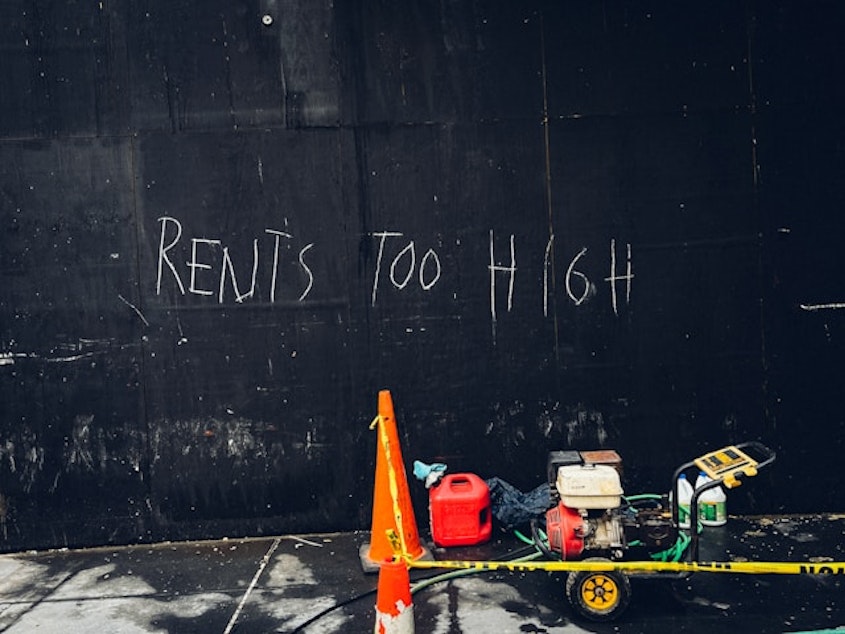Can rent stabilization help Washington residents?

Rent control, rent stabilization, and anti-price gouging — oh my! Those are three commonly referenced ideas when it comes to tackling skyrocketing rents.
It's a problem the Seattle area knows well. But these solutions are often conflated and may not fully address the issue causing the affordability crisis, according to Mike Wilkerson, an urban economist with ECOnorthwest, a local consulting firm focused on issues of housing, environment, economy, and more.
“Colloquially, everyone says ‘rent control.’ But I think often times ‘rent control’ is used in a negative connotation, versus the intentionality around using terms like ‘rent stabilization’ are painted in a more positive light,” Wilkerson told KUOW's Seattle Now.
Listen to the full conversation around Washington's rent stabilization bill on Seattle Now
Rent control
Rent control is what former Councilmember Kshama Sawant pushed for in Seattle before leaving office. None of her proposals passed. Basically, rent prices are capped at a certain level. If a tenant leaves a unit, the next tenant gets that exact same capped rate.
Sponsored
Rent stabilization
Rent stabilization offers more wiggle room. A rent stabilization bill is currently working its way through the state Capitol in Olympia. It already passed the House and is up for consideration in the Senate. This bill would cap any rent increases at 7% annually. But in between tenants, landlords can hike rent however they please. The bill also doesn't apply to new units on the market for 10 years.
Anti-price gouging
Anti-price gouging regulations also place a cap on rent increases with the goal of preventing massive hikes on a tenant.
Folks debate the ups and downs of these tactics, but Wilkerson argues that to really get ahold of affordability in the Seattle area, the root problem needs to be addressed — a lack of housing supply, and specifically a lack of affordable housing.
Sponsored
“Limiting the rent for someone who is already cost burdened isn’t necessarily alleviating the outcome we don’t like," Wilkerson said. "It's, on the margin, helping slightly. What we don’t like is the fact that someone is spending 30% or 50% of their income on rent; they’re likely to still do that with rent control. That’s where we think about, ‘OK, the root cause is we don’t have enough housing.’ What that means is, general affordability pressures aren’t relieved. That’s where policies like MHA, or inclusionary housing, or vouchers, or affordable housing that directly target someone’s income relative to the rent are the answer. I think when we’re trying to keep people in their homes, that is the answer. That’s where rent control, rent stabilization, or even anti-price gouging fall short.
“To argue that individuals aren’t going to benefit from any type of (rent control or stabilization) is wrong. The question is: ‘Is it the best solution?’ A harder question is: ‘What unintended consequences are there with that solution relative to other options?’ That’s where it gets very complicated.”
RELATED: Tacoma approaches affordable housing from a new angle: anti-displacement
The rent stabilization bill currently in the Legislature is falling along party lines. Democrats are more in favor. Republicans aren't into it, and argue that it will result in even less housing, and cause higher rents.
"Look at some of the examples of what has happened across our country, where rental caps, stabilization, control if you will, have been in place," Republican Rep. Chris Corry of Yakima said on the House floor Feb. 13. "Portland, for example, saw 6,400 units leave the housing market after their rent control was enacted, thus driving up rents and driving down availability. If we want to stabilize rents ... we need to build more housing. Unfortunately, this bill will have the exact opposite impact of that. I'm voting 'no' because I don't want to give people false hope."
Sponsored
In 2019, Oregon overturned its law banning rent control and passed a regulation that capped how much rents can rise in the state. California passed its own version in 2020. Both states' regulations mostly affect multi-unit buildings.
Wilkerson admits that after Oregon passed its rent control bill, the construction of housing did decline in the state, which is what opponents argued.
RELATED: Rent ‘control’ bill claws its way back in Olympia
"However, [housing construction] decreased everywhere because of the pandemic, followed by the commercial real estate disruption," he said. "So I don't think we have any great example of [declining housing construction], other than anecdote. An anecdote, when you talk to the development community ... you infrequently and almost never hear of rent control as the reason why. That's not to say that it may or may not have a factor. It's just top of mind issues aren't rent control. It's broad market conditions. It's general levels of affordability. It's construction costs. It's permitting costs ... you'd have to keep going down that list to get to rent control ... we would ideally have the benefit of time to study this more extensively."




